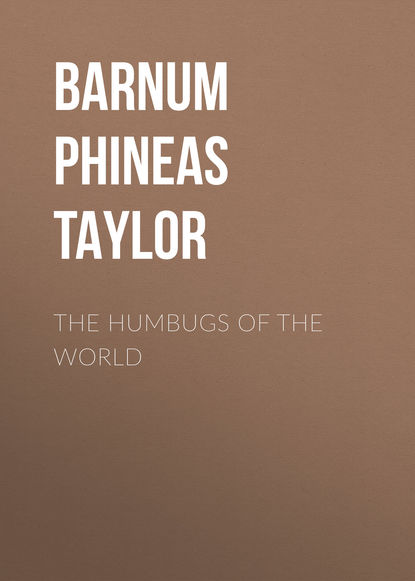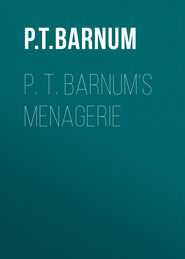По всем вопросам обращайтесь на: info@litportal.ru
(©) 2003-2024.
✖
The Humbugs of the World
Настройки чтения
Размер шрифта
Высота строк
Поля
“Mr. B., these golden pigeons are superb, but they cannot be from California. Audubon mentions no such bird in his work upon American Ornithology.”
I told him he had better take Audubon home with him that night, and perhaps by studying him attentively he would see occasion to change his mind.
The next day, the old naturalist called at my office and remarked:
“Mr. B., those pigeons are a more rare bird than you imagine. They are not mentioned by Linnæus, Cuvier, Goldsmith, or any other writer on Natural History, so far as I have been able to discover. I expect they must have come from some unexplored portion of Australia.”
“Never mind,” I replied, “we may get more light on the subject, perhaps, before long. We will continue to label them ‘California Pigeons’ until we can fix their nativity elsewhere.”
The next, morning, “Old Grizzly Adams,” whose exhibition of bears was then open in Fourteenth street, happened to be passing through the Museum, when his eyes fell on the “Golden California Pigeons.” He looked a moment and doubtless admired. He soon after came to my office.
“Mr. B,” said he, “you must let me have those California pigeons.”
“I can’t spare them,” I replied.
“But you must spare them. All the birds and animals from California ought to be together. You own half of my California menagerie, and you must lend me those pigeons.”
“Mr. Adams, they are too rare and valuable a bird to be hawked about in that manner; besides, I expect they will attract considerable attention here.”
“Oh, don’t be a fool,” replied Adams. “Rare bird, indeed! Why, they are just as common in California as any other pigeon! I could have brought a hundred of them from San Francisco, if I had thought of it.”
“But why did you not think of it?” I asked, with a suppressed smile.
“Because they are so common there,” said Adams. “I did not think they would be any curiosity here. I have eaten them in pigeon-pies hundreds of times, and shot them by the thousand!”
I was ready to burst with laughter to see how readily Adams swallowed the bait, but maintaining the most rigid gravity, I replied:
“Oh well, Mr. Adams, if they are really so common in California, you had probably better take them, and you may write over and have half a dozen pairs sent to me for the Museum.”
“All right,” said Adams; “I will send over to a friend in San Francisco, and you shall have them here in a couple of months.”
I told Adams that, for certain reasons, I would prefer to change the label so as to have it read: “Golden Pigeons from Australia.”
“Well, call them what you like,” replied Adams; “I suppose they are probably about as plenty in Australia as they are in California.”
I fancied I could discover a sly smile lurking in the eye of the old bear-hunter as he made this reply.
The pigeons were labeled as I suggested, and this is how it happened that the Bridgeport non-believing lady, mentioned in the next chapter, was so much attracted as to solicit some of their eggs in order to perpetuate the species in old Connecticut.
Six or eight weeks after this incident, I was in the California Menagerie, and noticed that the “Golden Pigeons” had assumed a frightfully mottled appearance. Their feathers had grown out, and they were half white. Adams had been so busy with his bears that he had not noticed the change. I called him up to the pigeon cage, and remarked:
“Mr. Adams, I fear you will lose your Golden Pigeons; they must be very sick; I observe they are turning quite pale!”
Adams looked at them a moment with astonishment; then turning to me, and seeing that I could not suppress a smile, he indignantly exclaimed:
“Blast the Golden Pigeons! You had better take them back to the Museum. You can’t humbug me with your painted pigeons!”
This was too much, and “I laughed till I cried” to witness the mixed look of astonishment and vexation which marked the “grizzly” features of old Adams.
“These Golden Pigeons,” I remarked, “are very common in California, I think I heard you say? When do you expect my half-dozen pairs will arrive?”
“You go to thunder, you old humbug!” replied Adams, as he marched off indignantly, and soon disappeared behind the cages of his grizzly bears.
From that time, Adams seemed to be more careful about telling his large stories. Perhaps he was not cured altogether of his habit, but he took particular pains when making marvelous statements to have them of such a nature that they could not be disproved so easily as was that regarding the “Golden California Pigeons.”
CHAPTER VI
THE WHALE, THE ANGEL FISH, AND THE GOLDEN PIGEON
If the fact could be definitely determined, I think it would be discovered that in this “wide awake” country there are more persons humbugged by believing too little than too much. Many persons have such a horror of being taken in, or such an elevated opinion of their own acuteness, that they believe everything to be a sham, and in this way are continually humbugging themselves.
Several years since, I purchased a living white whale, captured near Labrador, and succeeded in placing it, “in good condition,” in a large tank, fifty feet long, and supplied with salt water, in the basement of the American Museum. I was obliged to light the basement with gas, and that frightened the sea-monster to such an extent that he kept at the bottom of the tank, except when he was compelled to stick his nose above the surface in order to breathe or “blow,” and then down he would go again as quick as possible. Visitors would sometimes stand for half an hour, watching in vain to get a look at the whale; for, although he could remain under water only about two minutes at a time, he would happen to appear in some unlooked for quarter of the huge tank, and before they could all get a chance to see him, he would be out of sight again. Some impatient and incredulous persons after waiting ten minutes, which seemed to them an hour, would sometimes exclaim:
“Oh, humbug! I don’t believe there is a whale here at all!”
This incredulity often put me out of patience, and I would say:
“Ladies and gentlemen, there is a living whale in the tank. He is frightened by the gaslight and by visitors; but he is obliged to come to the surface every two minutes, and if you will watch sharply, you will see him. I am sorry we can’t make him dance a hornpipe and do all sorts of wonderful things at the word of command; but if you will exercise your patience a few minutes longer, I assure you the whale will be seen at considerably less trouble than it would be to go to Labrador expressly for that purpose.”
This would usually put my patrons in good humor; but I was myself often vexed at the persistent stubbornness of the whale in not calmly floating on the surface for the gratification of my visitors.
One day, a sharp Yankee lady and her daughter, from Connecticut, called at the Museum. I knew them well; and in answer to their inquiry for the locality of the whale, I directed them to the basement. Half an hour afterward, they called at my office, and the acute mother, in a half-confidential, serio-comic whisper, said:
“Mr. B., it’s astonishing to what a number of purposes the ingenuity of us Yankees has applied india-rubber.”
I asked her meaning, and was soon informed that she was perfectly convinced that it was an india-rubber whale, worked by steam and machinery, by means of which he was made to rise to the surface at short intervals, and puff with the regularity of a pair of bellows. From her earnest, confident manner, I saw it would be useless to attempt to disabuse her mind on the subject. I therefore very candidly acknowledged that she was quite too sharp for me, and I must plead guilty to the imposition; but I begged her not to expose me, for I assured her that she was the only person who had discovered the trick.
It was worth more than a dollar to see with what a smile of satisfaction she received the assurance that nobody else was as shrewd as herself; and the patronizing manner in which she bade me be perfectly tranquil, for the secret should be considered by her as “strictly confidential,” was decidedly rich. She evidently received double her money’s worth in the happy reflection that she could not be humbugged, and that I was terribly humiliated in being detected through her marvelous powers of discrimination! I occasionally meet the good lady, and always try to look a little sheepish, but she invariably assures me that she has never divulged my secret and never will!
On another occasion, a lady equally shrewd, who lives neighbor to me in Connecticut, after regarding for a few minutes the “Golden Angel Fish” swimming in one of the Aquaria, abruptly addressed me with:
“You can’t humbug me, Mr. Barnum; that fish is painted!”
“Nonsense!” said I, with a laugh; “the thing is impossible!”
“I don’t care, I know it is painted; it is as plain as can be.”
“But, my dear Mrs. H., paint would not adhere to a fish while in the water; and if it would, it would kill him. Besides,” I added, with an extra serious air, “we never allow humbugging here!”
“Oh, here is just the place to look for such things,” she replied with a smile; “and I must say I more than half believe that Angel Fish is painted.”
She was finally nearly convinced of her error, and left. In the afternoon of the same day, I met her in Old Adams’ California Menagerie. She knew that I was part-proprietor of that establishment, and seeing me in conversation with “Grizzly Adams,” she came up to me in some haste, and with her eyes glistening with excitement, she said:
“O, Mr. B., I never saw anything so beautiful as those elegant ‘Golden Pigeons’ from Australia. I want you to secure some of their eggs for me, and let my pigeons hatch them at home. I should prize them beyond all measure.”
“Oh, you don’t want ‘Golden Australian Pigeons,’” I replied; “they are painted.”
“No, they are not painted,” said she, with a laugh, “but I half think the Angel Fish is.”








